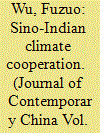| Srl | Item |
| 1 |
ID:
178563


|
|
|
|
|
| Summary/Abstract |
At the United Nations Framework Convention on Climate Change negoti- ations, India has repeatedly pushed for urgent international action on climate change, while simultaneously refusing to limit its own emissions, frustrating other participating countries. The extant economic and strategic interest-based expla- nations do not sufficiently explain some key anomalies in India’s international climate policy and have justified such contradictions in India’s diplomatic dis- course as realpolitik or pragmatic diplomacy. We argue that in order to facilitate India’s meaningful participation in the international climate change regime, we need to engage with these contradictions and understand India’s aspirations for moral and material leadership that stem from the complex interaction between economic and strategic interests and ideational factors. We posit that India’s anti-colonial discourse that repudiated Western materialism, along with its de- sire to be a moral power in global politics coupled with its desire to mimic the western standard of living, creates a development dilemma for India’s postcolo- nial identity in the global climate change regime. India’s continuous attempt to resolve this dilemma has produced specific frames–projecting itself as a victim, mistrust of the West, framing the Earth’s CO2 carrying capacity as extended sovereign territory, and national exceptionalism–in the climate change discourse. These frames are consistent with India’s broader foreign policy discourse as a postcolonial nation and have coalesced India’s claim to moral leadership, seek commitments from developed countries to do their part, and simultaneously play- ing a limited role in the international climate regime.
|
|
|
|
|
|
|
|
|
|
|
|
|
|
|
|
| 2 |
ID:
114229


|
|
|
|
|
| Publication |
2012.
|
| Summary/Abstract |
The international climate change regime is comprised of the United Nations Framework Convention on Climate Change and its Kyoto Protocol. Under the regime, China and India, two of the largest developing countries, have been exempted from any binding greenhouse gas (GHG) emissions reduction targets that apply to developed countries. However, with their GHG emissions increasing, China and India have faced growing international pressure to undertake binding mitigation obligations in international climate change negotiations. To enhance their bargaining power in the negotiations, China and India have been cooperating with each other, which has not only led to a new approach to addressing climate change but also defended the ethical benchmark of the regime. In addition, their cooperation has weakened the EU's traditional leadership status and the leadership ambitions of the US such that China and India will now play a more important role in shaping the future of the regime.
|
|
|
|
|
|
|
|
|
|
|
|
|
|
|
|